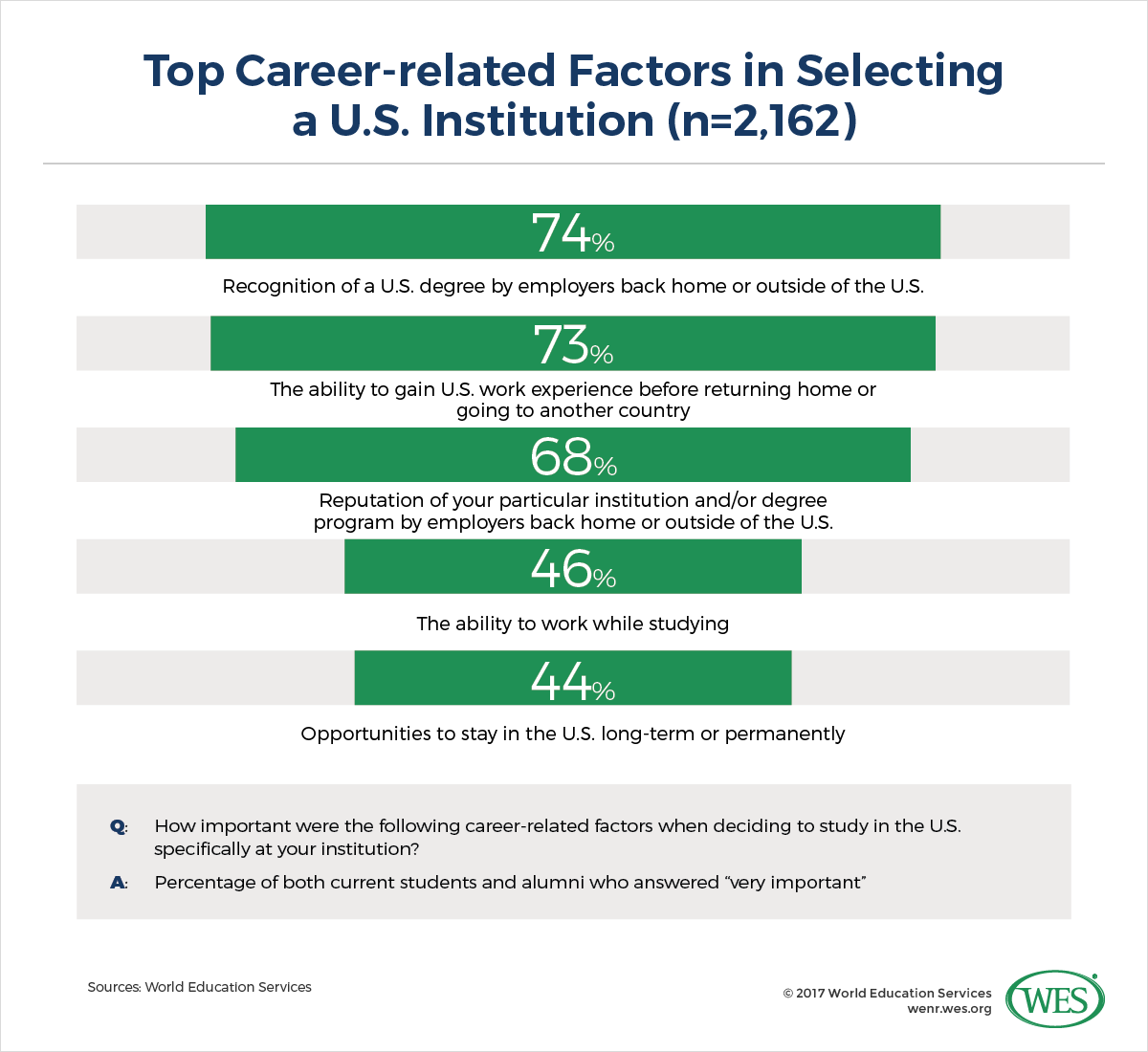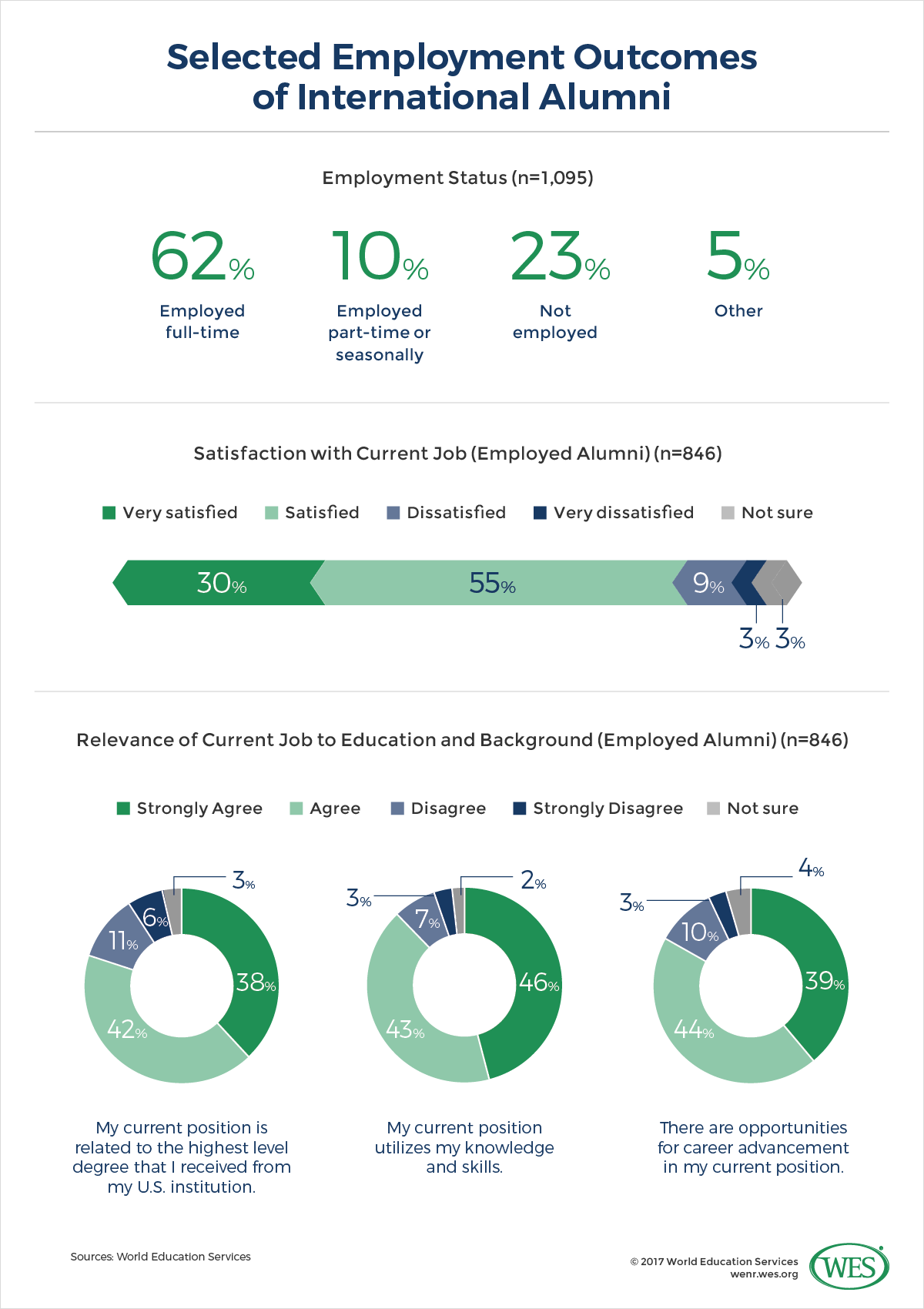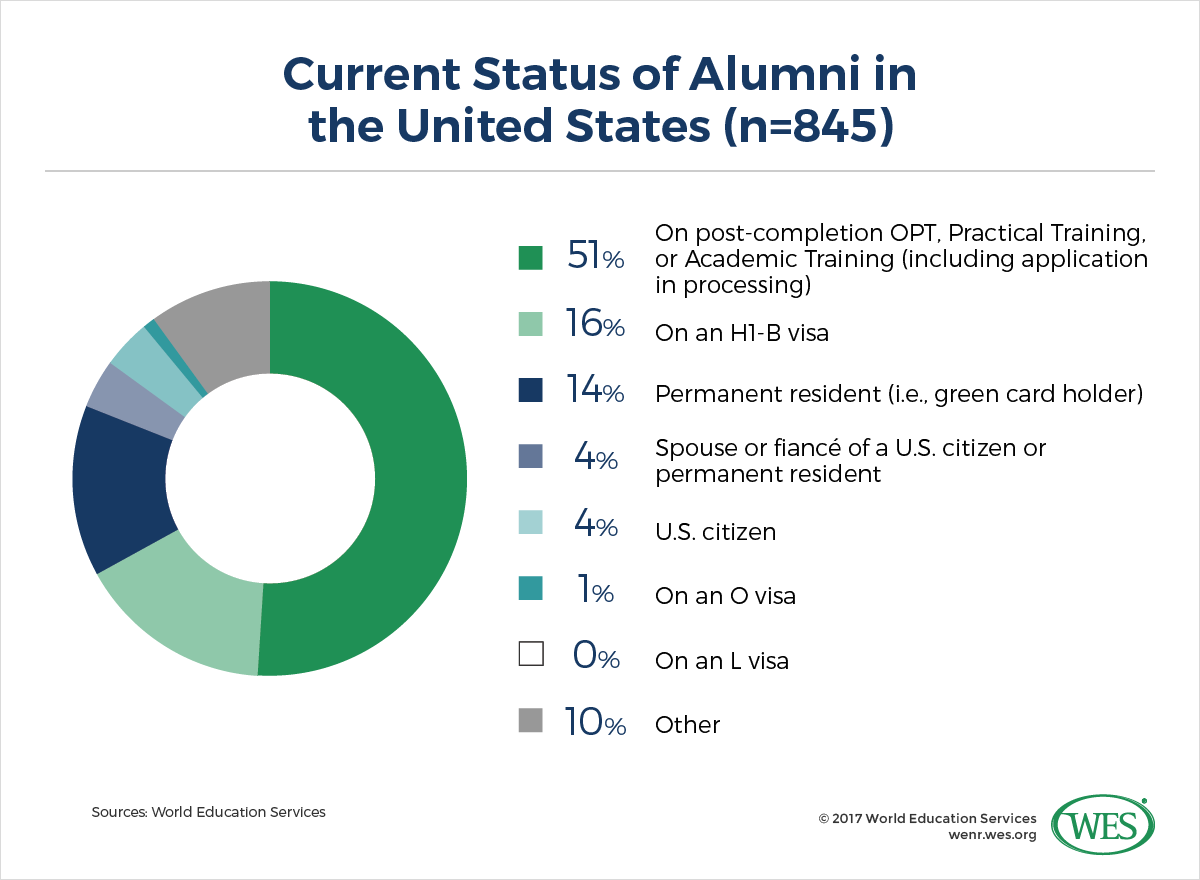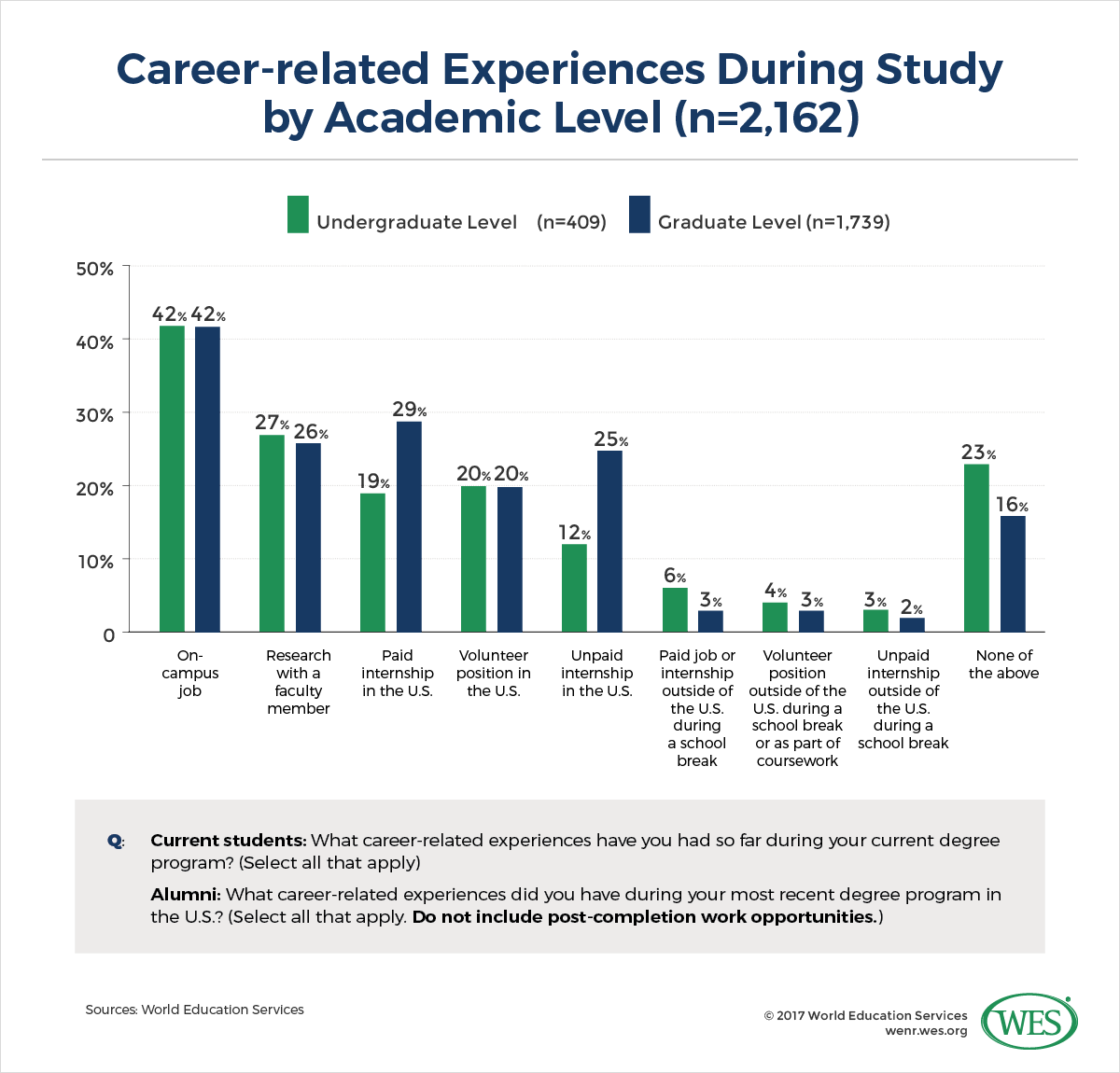Bryce Loo, Research Associate, Ning Luo, Research Associate, and Ziyi Christine Ye, Research Assistant, WES
International students, especially those bound for the United States, are heavily driven to study abroad by one factor: improved career prospects. By coming to the U.S., they hope for a competitive advantage regardless of where they ultimately reside and work after graduating.
The current political environment in the United States has added urgency to the mission of international educators and those working on helping international students with career preparation. An increase in increased xenophobic and nativist sentiments [1], coupled with proposed cuts to work opportunities for temporary foreign workers [2], namely the H1-B visa program, threatened to dampen interest among international students who hope to obtain work experience in the United States.
Yet, beyond anecdotes and stories in the mainstream press, we know relatively little about the career outcomes of international students who have earned degrees in the United States. And the anecdotal evidence that exists is mixed: There are plenty of stories of great success among international graduates. At the same time, there are troubling stories coming out of countries like China, where some returnees from the U.S. have faced challenges accessing the local job market [3] and are even at a disadvantage relative to locally-educated students.
In order to advance campus conversations and to provide a bird’s eye view on the topic, WES surveyed 1,067 current international students and 1,095 international alumni who have studied in the U.S. on an F-1, J-1, or M-1 visa. We were able to segment many of the results by most regions of origin, academic levels, and whether or not the field of study was in a STEM (science, technology, engineering, and mathematics) field.
For the full findings, please download the free report available at www.wes.org/career-outcomes [4]. Below are some of the main findings of the study.
The Importance of Student Satisfaction and Career Prospects
Last year, research that we conducted on the international student experience illuminated a crucial finding: International students who are satisfied with their U.S. institution are much more likely to recommend it to peers. This indicates that international student recruitment and the student experience on campus are intertwined. We again asked respondents about their satisfaction levels this year and discovered a similar finding: The vast majority of both current international students and international alumni believed that their U.S. education was a good investment. A strong majority – 92 percent of current students and 89 of alumni – said that they agreed or strongly agreed with this notion.
However, we found that slightly fewer students, though still a substantial majority, felt positively about their career prospects. Eighty-five percent of current students and 88 percent of alumni agreed or strongly agreed with this. Luckily, most students seem to feel confident both about their education and career prospects, but the latter feels less certain for some.
Career Factors in Selecting a U.S. Institution
We learned that career factors involving returning home are particularly important to international students:
- Most respondents considered the recognition of a U.S. degree back home or abroad and U.S. work experience each critical when selecting a U.S. institution. Seventy-four percent and 73 percent of all respondents respectively cited these factors as being “very important.” For example, 89 percent of current students and 85 percent of alumni considered recognition of a U.S. degree at home or abroad to be “very important.” Additionally, 68 percent considered the reputation of the U.S. institution and/or program among employers back home to be “very important.”
- Considerably fewer respondents were concerned with the ability to work while studying (46 percent) and the possibility of staying in the U.S. long-term or permanently (44 percent). The latter result indicates that students either had always planned on returning home or recognized the likely difficulties in obtaining the authorization to stay in the U.S. beyond their student visas.
Employment Expectations and Outcomes
International students have a range of different options in terms of work once they have graduated. Among them, making use of post-completion work training programs – optional practical training (OPT) and academic training – remains the most popular choice. Gaining work experience in the U.S. in general appears to be highly desirable.
- Most current students (75 percent) wished to use OPT and academic training and a majority even wished to stay in the U.S. beyond post-completion work training (63 percent).
- Using post-completion work training opportunities remained the main goal of alumni from enrollment to graduation. Sixty-eight percent of alumni said that this was one of their top two options under consideration for after graduation at the time of enrollment. Forty-three percent considered it their primary option at the time of graduation. The second most desired option for after graduation was to remain in the U.S. long-term or permanently, with 23 percent considering it their top priority at graduation.
Overall, employment outcomes for alumni are reasonably good, but there are areas that could use improvement.
- Nearly two-thirds (62 percent) of international alumni were employed at the time of the survey, and a large majority (82 percent) received an employment offer within the first six months of graduation. Most of those who were unemployed cited work authorization regulations (44 percent) and lack of professional connections (35 percent) as the main reasons why.
- Nearly 40 percent of employed alumni believed that their salaries were lower than expected for someone of their background, though most could live comfortably on their salary (72 percent). It may be that many students have inflated expectations about their careers after graduation, particularly in the first few years, as many indicated that they could live comfortably but not to the level that they were expecting.
For those alumni who have remained in the U.S. after graduation, whether to stay short-term or long-term (if possible), the work authorization and visa regulations govern all aspects of career for those not (yet) permanent residents or citizens. These challenges start from the time students enroll through to post-graduation work in the U.S.
- Half (51 percent) of U.S.-based alumni were on OPT or Academic Training, and most others residing in the U.S. (75 percent) used these opportunities earlier on. The next most common statuses were H1-B visa holders (16 percent) and permanent residents (14 percent).
- Among those on shorter-term visas (e.g., H1-B visas), about one-third (34 percent) wished to stay in the U.S. long-term or permanently. It is unclear how many of them will actually be able to.
- Across the board, from enrollment to professional contexts after graduation, international students in the U.S. found the biggest challenge to be work authorization regulations. In terms of a challenge while finding work or internships as a student, slightly over half (51 percent) of current students and 67 percent of alumni cited it as a top barrier. Similarly, 47 percent of alumni residing in the U.S. cited it as a major issue, the most cited overall.
When it comes to deciding where to live and work after graduation, international students’ decision-making is highly nuanced.
We wished to capture these complexities, particularly for students who returned home. We classified factors in deciding to return home into two groups: work/visa-related reasons and lifestyle/relationship-related reasons. We asked respondents which of these groups weighed more on their decision, and we asked about specific factors within each group. It was found that:
- Nearly half (47 percent) of all alumni who returned home did so mostly or entirely for work- and visa-related reasons. Thirty-two percent – nearly one-third – said that their decision to leave and return home was entirely based on work- and visa-related issues. The top three reasons within this group – each cited roughly by about one-third of alumni in their home countries – were good job opportunities at home, trouble securing work visa sponsorship, and trouble securing a good job opportunity in the U.S.
- Meanwhile, 29 percent said lifestyle- or relationship-reasons were the main drivers. The top reason in this group, by a wide margin, was family and friends back home (39 percent).
- Over 40 percent of students who returned home cited no difficulties in adjusting to the professional environments in their home countries, despite their generally U.S.-oriented training. The biggest professional challenge noted is lack of good job opportunities (22 percent).
Relatively few alumni respondents to our survey resided in a third country. Among those who were, the largest numbers were living in Canada (18 percent).
Career Services and Employment Experiences While Enrolled
The results in terms of international students’ use of campus career services offices are mixed.
- Over 40 percent of current students had not yet utilized the services provided by the career services office on their campus. The biggest reason for this, according to over half of this group (54 percent), was that they were not yet ready for the job search. This likely indicates that large numbers of international students do not start career preparation until later in their program, likely later than they should.
- Two-thirds of alumni utilized services from the campus career services office while enrolled. While this number is relatively high, particularly compared with the number of current students who had used these services, there is room for improvement.
- Among career preparation services provided by the career services office, both current students and alumni were most satisfied with résumé (or CV) and cover letter writing preparation services, followed by career preparation seminars and workshops. Seventy-nine percent of both current student and alumni respondents were either “satisfied” or “very satisfied” with résumé services. There were higher dissatisfaction rates for interview preparation services (e.g., mock interviews) and career counseling.
Most international students came to the U.S. with at least some experience and gained more while studying:
- The most common career experience that both current students and alumni obtained during studies was on-campus jobs (42 percent overall).
- Among all respondents, graduate students were much more likely to have an internship than undergraduates. Twenty-nine percent of graduate students had a paid internship and 25 percent an unpaid internship, compared with 19 percent and 12 percent respectively.
- About 16 percent of alumni had no career-related experience – job, internship, volunteer, or research opportunity – while a student.
- One-third of alumni noted that they did not use the career services office to prepare for careers outside of the United States. Nearly one-third (30 percent) did use these services and said that they were “not very helpful” or “not helpful at all.” Similarly, about two-thirds (65 percent) of alumni did not use the career services office to find and secure a job outside of the U.S., or did not find it helpful.
- Relatively few take advantage of work experiences, such as internships, outside of the U.S. during school breaks or as part of coursework. Only 5 percent of all respondents have had a paid job or internship outside of the U.S. during a school break or as part of a cooperative (co-op) program.
Top-line Recommendations
International students come to the U.S. in large part to boost future career outcomes. If students are not, or do not feel, they are supported in this regard, they may choose to go elsewhere or even just stay home. We recommend some of the following for institutions – the Career Services Office, International Student & Scholar Services (ISSS) Office, and other relevant services – to follow:
- Find ways to educate international students very early in their programs about the Career Services Office and encourage and incentivize them to come early. Likely, too many students come to this office later in the programs than they should.
- Develop methods to help students connect with job opportunities outside of the U.S., particularly back home, as many or most will eventually need to leave. One method for doing so is to encourage students to take up internship or volunteer opportunities in their home countries during school breaks, or as part of cooperative (co-op) programs.
- Coach students to advocate for themselves regarding their visa and work authorization status, and take time to educate employers in your network about the regulations and the how international students can be strong assets for any company.
Recruiters and others in enrollment management can consider the following:
- Highlight the successes of alumni who have returned home as many, if not most, will return home sometime after they graduate.
- Discuss the realistic possibilities for students to utilize OPT and Academic Training opportunities. In general, it is important to balance showcasing work opportunities in the U.S. for students with assisting students in developing realistic expectations.
- Help educate matriculating students early about the importance of early career preparation and about the career services office.




